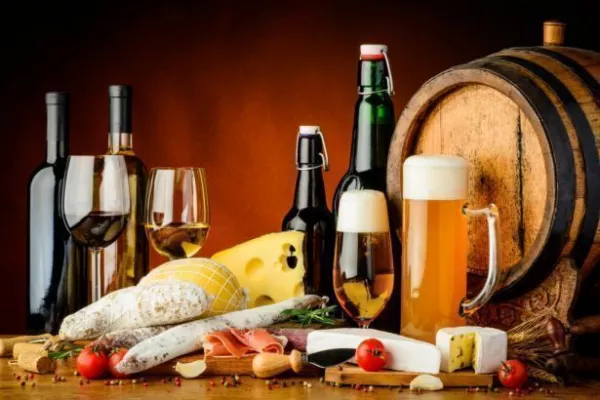Hospitality Ireland present a round-up of global food, hospitality venue and drinks news.
EU Commission Proposes Rules To Boost Social Rights For Gig Workers
The European Commission announced on Thursday December 9 draft rules to give workers at online platform companies such as Uber and Deliveroo better social rights and also create a level playing field between these companies and traditional businesses.
Online platform companies that set pay and conduct standards for their workers will have to classify them as employees entitled to a minimum wage, paid holidays and pension rights.
The companies will also be considered an employer if they supervise the performance of work through electronic means, restrict workers' ability to choose their working hours or tasks and prevent them from working for third parties.
The EU executive said the draft rules could apply to between 1.7 million and 4.1 million workers from the 28 million working at more than 500 online platform companies across the 27-country bloc.
FOCUS-Starbucks Union Drive Spurred By Barista Burnout From Mobile Orders
Starbucks Corp baristas waging a union campaign in Buffalo, New York, say they are organizing in part to have more of a say in the workload created by the company's mobile app, which has left them struggling to keep up with surges in orders for $6 Frappuccinos and other custom coffee drinks.
On Thursday December 9, the National Labor Relations Board will tally ballots from employees at three stores in the area. Baristas and shift supervisors there are seeking to join Workers United, an affiliate of the Service Employees International Union. They need a simple majority of votes cast for each store to win at that location.
The pandemic has created a surge in mobile orders at Starbucks and other restaurant chains. The baristas in Buffalo and elsewhere complain that they cannot limit the number of mobile orders per hour, leading to unexpected surges they struggle to fulfill.
Individual stores can turn off mobile orders completely for their locations temporarily, but that requires a manager's approval, the company confirmed, and customers can then order from other nearby locations.
Baristas said that adds to those other stores' burdens, but the company said such shifts do not necessarily lead to overflows in other stores.
The union election involves about 100 workers altogether, a tiny fraction of the roughly 220,000 employees in the U.S. cafes of Seattle-based Starbucks. But a win in Buffalo could catch fire as baristas who have also complained about thin staffing and little control over workplace conditions enjoy more power in a tight labor market.
Since the Buffalo campaign was announced in August, three other nearby locations and one store as far away as Arizona have sought to follow its lead.
"We respect the process that is underway and, independent of any outcome in these elections, we will continue to stay true to our Mission and Values," Starbucks Chief Executive Officer Kevin Johnson told employees in a letter on Tuesday December 7.
Employees who spoke with Reuters said they want higher wages, seniority pay and better staffing levels. But burnout from mobile orders and frustration with other tech systems has been an important driver in the campaign, interviews with five workers suggest.
"Technology was made for customers and not for employees," said Casey Moore, a barista at one of the Starbucks locations whose votes are being counted on Thursday December 9. "Without a union we haven't been able to voice how the technology could also work for us."
A Starbucks spokesman said the company is constantly updating its app based on employee and customer feedback.
Moore and other employees interviewed by Reuters said they are not opposed to tech in principle but want more of a say in how it is developed and deployed in stores.
When Starbucks launched seasonal holiday drinks and gave out free tumblers in November, the mobile ordering system was so inundated with orders at one Buffalo area store that staff fell behind by as much as 40 minutes and threw away at least 30 drinks abandoned by customers, said James Skretta, a barista there.
The chain has about 20 stores in and around Buffalo. It launched its app in 2009 but added new ways to pay and earn points in 2020 as rewards memberships soared during the pandemic.
The mobile order app "completely changed what it means to be a barista," said Danka Dragic, a shift supervisor at one Buffalo area store.
Starbucks baristas are not the only workers who have balked at stores' high-tech makeovers. Five workers at a Chipotle Mexican Grill Inc location in Austin, Texas, quit after becoming overwhelmed with mobile orders, according to media reports.
Walmart Inc in June rolled out an app that it said enables employees to complete various tasks from their phones, but labor advocates warned the technology could open the door to more stringent productivity quotas.
A Walmart spokesperson said the app eases aspects of work including scheduling, clocking in and communication for employees.
"Workers across industries are challenging the creep of punitive technology in the workplace," Bianca Agustin, corporate accountability director at labor nonprofit United for Respect, said in a statement.
The International Brotherhood of Teamsters has fought to ensure sensors and other technology installed in United Parcel Service Inc trucks are not used to punish drivers, and hospitality union UNITE HERE has pushed for tech aimed at boosting worker protection, including safety buttons for hotel cleaners.
Starbucks baristas also chafe at a performance management program that rates their customer service - especially because they are under pressure by other technology that tracks how fast they process drive-thru orders.
"It's as though you are making drinks under the pressure of trying to defuse a ticking time bomb," Skretta said.
INSTANT VIEW-Companies Divided On Draft EU Rules For Gig Economy Workers
The European Commission published draft rules on Thursday December 9 to give workers at online platform companies such as Uber and Deliveroo better social rights, but which companies say could lead to job losses and more litigation in court.
Following are initial reactions to the proposals:
UBER SPOKESPERSON:
"Uber is committed to improving the working conditions for the hundreds of thousands of drivers and couriers who rely on our app for flexible work.
"But we are concerned the Commission's proposal would have the opposite effect - putting thousands of jobs at risk, crippling small businesses in the wake of the pandemic and damaging vital services that consumers across Europe rely on.
"As countries including France have demonstrated, there is a better way and any EU-wide rules should allow drivers and couriers to retain the flexibility we know they value most, while allowing platforms to introduce more protections and benefits."
DOMINICK MOXON-TRITSCH, BOLT'S VP OF REGULATION & PUBLIC POLICY:
"We are disappointed that the European Commission is proposing to sacrifice the flexibility and efficiency of platform work through the reclassification of employment. It seems to be a one-sided approach that doesn't take all available options into consideration.
"The proposal made by the Commission means that hundreds of thousands of ride-hailing drivers and delivery couriers would lose the opportunity of platform work, as platforms would be forced to shift to an exclusive full-time employment model.
"This would negatively impact working conditions for platform workers, reduce their earning opportunities, and severely impact tens of millions of European citizens who benefit from platform services today."
RAPID DELIVERY COMPANY GORILLAS:
"We have employed our team members through permanent contracts to provide access to health insurance, social security, paid sick-leave, vacation times, and fair wages above minimum wage.
"In this spirit, we have grown from 0 to over 12,000 employees in less than two years. And as we are highly invested in creating an environment where all of our team can grow, we are also convinced that our current economy requires a certain amount of flexibility to allow for innovations to develop."
PETRA BOLSTER OF DUTCH LABOUR UNION FNV:
"This proposal tackles abuse and exploitation of a large group of workers. We see this proposal as a great step forwards.
"Platform workers deserve security about their income and work, protection from sickness and say over their working hours. Provisions such as pay to be on call, sick pay, time off, vacation pay and pensions must apply to them too."
"Delivery Hero fully supports the European Commission’s aim to improve the labor conditions of platform workers.
"However, we strongly believe that the suggested criteria to trigger the proposed rebuttable presumption of employment and reversed burden of proof are too broad and would not contribute to that goal. This would also have disproportionate restrictions for self-employed platform workers and put limitations on the flexibility we know they value most."
JITSE GROEN, CEO AT JUST EAT TAKEAWAY:
"As Europe's largest food delivery platform, Just Eat Takeaway.com welcomes and fully supports the EU Commission's proposals to improve conditions for workers and help them access social protections.
"We hope that the Commission's proposal will create clarity and a level playing field that ensures that companies across Europe are held to the same standards, so that all platform workers are treated with the dignity they deserve."
DENNIS RADTKE MEP, EPP GROUP SPOKESMAN ON SOCIAL AFFAIRS
"The EU has high standards when it comes to fair working conditions. Platforms like Uber or Deliveroo cannot be the exception.
"New ways of doing business should not lead to precarious working conditions. That is why I am happy to see that the European Commission has listened to our urgent calls for better rights for workers of these platforms."
Top of Form
France’s InVivo Aims To Become Top World Malt Producer After Soufflet Takeover
InVivo aims to become the world's largest producer of beer ingredient malt within five years, supported by new investors after it completed the acquisition of agribusiness peer Soufflet, its chief executive said on Thursday December 9.
The takeover, which values Soufflet at €2.2 billion,will give rise to a group with nearly 10 billion euros in sales from activities spanning grain trading and wine distribution.
It marks a new stage in CEO Thierry Blandinieres' overhaul of InVivo, a combination of nearly 200 farmer cooperatives that he would like in future to rival global crop merchants such as Archer Daniels Midland Co and Cargill.
To help finance the acquisition, InVivo is selling a minority stake in Soufflet's malt division to KKR, Credit Agricole and Bpifrance for €440 million.
InVivo aims to double the size of its malt business through external growth. Deals are already being studied in South Africa, the United States, Australia, India and South America, notably Brazil, Blandinieres told Reuters on the sidelines of a news conference.
“We will be the biggest, with a share of 20% of the world market since we have 10% today. This is really what is at stake, why we are giving ourselves the means and why financial players have entered the capital," he said of the malt business.
To finance the purchase of Soufflet, InVivo also used around 1 billion euros in proceeds from the sale of its animal nutrition unit to ADM in 2019, as well as some debt, he said.
It has also entered exclusive talks to sell the Soufflet Alimentaire unit to French oilseeds and protein group Avril.
InVivo later announced in a separate statement that it had obtained a €1.65 billion bank loan that would partly support future investments.
In grain trading, InVivo and Soufflet would continue to operate separately, but risk strategy would be shared and current Soufflet trading chief Jean-Francois Lepy would take overall charge, Blandinieres added.
InVivo and century-old family firm Soufflet are among the largest players in the French agricultural sector, the EU's biggest.
Soufflet Chief Executive Jean-Michel Soufflet will stay with the group for a few months to support the transition, Blandinieres added.
The closing of InVivo's takeover of Soufflet followed approval last month by the European Commission after the deal was agreed in May.
EU Targets Uber, Deliveroo Model With Gig Workers' Rights Plan
The European Commission announced draft rules on Thursday December 9 to give many drivers for online firms such as Uber and Deliveroo employee benefits, a move labour unions say is overdue but some companies argue will lead to job losses.
The proposal, a global first that needs to be thrashed out with EU countries and lawmakers before it can become law, marks the latest attempt by the European Union to regulate tech companies and ensure a level playing field between online and traditional firms.
"No one is trying to kill, stop or hinder the development of the platform economy," Jobs and Social Rights Commissioner Nicholas Schmit said at a news conference introducing the proposals.
However, the rules were needed to ensure that new business models uphold labour laws, he said.
The EU executive said the draft rules could apply to around 4.1 million of the 28 million workers at online platform companies across the 27-country bloc.
Internet firms that set pay and standards of conduct for their couriers would have to classify them as employees entitled to a minimum wage, paid holidays and pension rights, according to the draft rules.
Online food ordering and delivery companies, which are generally loss-making in an industry seen as ripe for consolidation, have fought court cases around Europe and the United States to have riders and drivers classified as self-employed contractors, rather than employees - with mixed results.
Reactions to the EU plan varied, with CEO Jitse Groen of Europe's largest food delivery company Just Eat Takeaway.com, which also owns Grubhub in the United States, saying he welcomed them.
However, "Delivery Platforms Europe", a lobby group that includes Uber, Deliveroo, Glovo and Delivery Hero, said in a statement that what part-time drivers wanted most was flexibility on their working hours and the rules as proposed would lead to job losses.
Petra Bolster of Dutch labour union FNV, which won lawsuits against Deliveroo and Uber over employment, noted the proposal included a list of five tests to help determine when couriers were self-employed.
"That's naive because platforms will use that as a toolkit to get around the criteria and get away with everything," she said. "It is their entire profit model to avoid costs of employment."
Under the EU proposal, companies will be considered employers if they supervise the performance of workers through electronic means, restrict their ability to choose their working hours or tasks and prevent them from working for third parties.
Crucially, the proposal shifts the burden of proof onto companies when a dispute arises as to whether a worker is a self-employed contractor or an employee.
Leonid Popa, a Russian immigrant who was an Uber driver in the Netherlands for four years, said the idea he had been self-employed had been a "fiction" but he was left without work and forced to seek government assistance when the COVID-19 pandemic struck.
"The whole story was nonsense. There was no flexibility, you don't earn much, you have to work more than 40 hours to earn a basic living and there's just really no feeling of security," he said, adding that he hoped better regulation would help his former colleagues.
Giles Thorne, an analyst for Jefferies, said the EU proposal would not destroy online ordering and delivery models, which were here to stay, but would give a little more power to couriers.
For consumers, the long-term result of European protections for workers would likely be a small increase in either prices or delivery fees.
But "I would bet my bottom dollar that people keep ordering bento boxes online", Thorne said.
Tyson Foods Plans To Spend $1.3bn To Automate Meat Plants
Tyson Foods Inc plans to spend more than $1.3 billion to increase automation in meat plants over the next three years, Chief Executive Donnie King said on Thursday December 9, as a U.S. labor shortage has limited production while demand is booming.
Meat processors have been unable to find enough workers for the past two years due to the tight labor market and health concerns during the COVID-19 pandemic.
Tyson expects to boost production and reduce labor costs by expanding automation, with cumulative savings of more than $450 million projected by fiscal year 2024, King said on a webcast for investors.
The company will increasingly use machines, instead of people, to debone chicken, one of its most labor-intensive jobs and a position with high turnover, said David Bray, group president of Tyson's poultry division. A capital investment of $500 million in the area through fiscal year 2024 will generate labor savings equal to more than 2,000 jobs, he said.
Profitability in Tyson's chicken unit has declined partly due to the labor shortage and because processing plants are operating below full capacity, Bray said.
"We are not servicing our customers to the degree that they expect us to," Bray said.
Tyson slaughtered about 37 million chickens a week on average in fiscal year 2021, accounting for 80% capacity utilization, and will increase processing to 40 million birds weekly in fiscal year 2022, or 85% capacity, Bray said.
The company aims to slaughter 47 million birds a week over time, reaching about 98% capacity utilization, to meet strong demand, he said.
"Demand is outpacing supply," he said.
Tyson shifted production during the pandemic to adapt to soaring demand at grocery stores and reduced sales at restaurants.
About 59,000 U.S. meatpacking workers were infected with COVID-19 through January at plants run by Tyson and competitors, according to a U.S. House of Representatives subcommittee report.
Starbucks Workers Vote To Unionize At Buffalo, New York, Store
Starbucks Corp employees on Thursday December 9 voted to join a union at one store in Buffalo, New York, delivering the coffee chain its first unionized company-owned location in the United States. Workers at a second location in the city voted to reject the drive to organize.
Employees at one Starbucks location in Buffalo voted to join Workers United, an affiliate of the Service Employees International Union.
The vote count for a third store in the upstate New York city ended without a definitive result because a number of ballots were still under review, a process that could stretch into early next year, according to Ian Hayes, an attorney for the union.
"We will keep listening," Rossann Williams, president of Starbucks North America, said in a letter to employees after the vote. "These are preliminary results with no immediate changes to our partner relationship as the NLRB process continues."
The closely watched results come as Corporate America eyes new union organizing campaigns amid a U.S. labor shortage that has already led to higher wages at most large retailer and restaurant chains. Experts said the Starbucks results may encourage union activity at other companies.
"Although it's a small number of workers, the result has huge symbolic importance," said John Logan, a labor professor at San Francisco State University.
E-commerce company Amazon.com Inc is facing a new election at one of its Alabama warehouses after results of the previous election - which the union lost - were overturned last month.
The Buffalo election involved just over 100 workers altogether, a tiny fraction of Starbucks' roughly 220,000 employees in its U.S. cafes.
Even so, the union victory could embolden other baristas to launch organizing drives at some of the company's more than 8,000 other company-owned U.S. cafes. Already, three other Buffalo-area stores and one store in Mesa, Arizona, have petitioned the National Labor Relations Board to join the union.
"I am absolutely optimistic," said James Skretta, a barista at one of the other New York stores to call for an election. "We feel as though this is validation for what it is that we've been doing."
The outcome encourages Skretta to "withstand what we know will continue to be an aggressive anti-union campaign," they said.
Shares of the Seattle-based company closed about 1% lower at $115.35 on Thursday December 9.
Some local baristas had decried what they said were aggressive company tactics, including flooding Buffalo locations with executives, holding meetings with employees and even bringing in ex-CEO Howard Schultz to talk to workers and extol the virtues of existing wage hikes and benefits.
Starbucks denies that any of its actions amounted to union busting.
The company had several unionized cafes and a roastery in the United States the 1980s, but all eventually decertified. It beat back more recent organizing campaigns in Philadelphia and New York City. One location in Canada unionized in 2020.
In Buffalo, about 15 Starbucks employees who support the union drive gathered in a room to watch results. Many jumped, screamed and hugged when they realized they had enough votes to win the first store to be counted, on Elmwood Avenue.
The vote was 19-8 in favor of joining the union.
Baristas and shift supervisors from the second location on Camp Road voted 12-8 to reject the union. Hayes, the union's lawyer, said during a news conference that the union will challenge those results.
FOOD DELIVERY COMPANY FLINK SAYS SECURED $750 MILLION IN ADDITIONAL FUNDING LED BY DOORDASH, MUBADALA CAPITAL, AS WELL AS NEW AND EXISTING INVESTORS
German Delivery Startup Flink Raises $750m In Financing Round
Grocery delivery start-up Flink has raised $750 million in an additional funding round, it said on Friday December 10, giving the German company the funds to further expand and cash in on the home food delivery boom.
Flink is one of several food delivery start-ups, including Gorillas, Getir, and Weezy, that have grown rapidly during the COVID-19 pandemic by delivering groceries within minutes of an order being placed via smartphone app.
Its Series B funding round was led by U.S. tech firm Doordash in September, and also included investors such as Mubadala Capital, part of Abu Dhabi's sovereign wealth fund.
The money would be used to expand its operations. The privately-held company currenctly has more than 140 delivery hubs in over 60 cities, reaching up to 10 million customers, with Germany and the Netherlands its largest markets.
"We are just getting started as we receive daily questions from people who ask, when they can reach our services," said founder Oliver Merkel.
News by Reuters, edited by Hospitality Ireland. Click subscribe to sign up for the Hospitality Ireland print edition.
Less Wine Consumed During COVID-19 Pandemic, Research Reveals
Wine and champagne consumption has been affected by the COVID-19, according to new research.
A statement announcing the new research said, "The health crisis has affected the consumption of wine and champagne considerably, according to new research from Professor Nathalie Spielmann from NEOMA Business School.
"Carried out with a panel of more than 3,000 consumers, Professor Spielmann analysed wine consumption behaviour in France from 2014 to 2021 and found that the health crisis has led to a sharp decline in wine consumption, both in terms of volume and value.
"'The health crisis caused purchases to fall to a lower level than in 2014, with a drop of 30%,' says Professor Spielmann.
"Distribution channels have also been impacted over the last seven years. Between 2014 and 2020 there was a real growth in purchases in specialised shops, the year 2021 is marked by the return in force of supermarkets as a place to buy wine.
"Interestingly though, Professor Spielmann found that although consumers are increasingly careful about the amount spent per bottle (€19.66 on average in 2014 vs. €13.91 in 2021), this trend does not affect the champagne sector.
"'Champagne is a product whose perceived quality is increasing, and consumers are therefore more inclined to spend a large proportion of their budget on champagne,' Professor Spielmann says.
"As well as this, the study also looked at the difference between men and women's wine consumption before the pandemic, which revealed a more consistent consumption among women than among men.
"Before the health crisis, while consumption among women stabilised (from 6.16 bottles to 6.15 bottles per month between 2014 and 2020), consumption among men increased over the same period (from 7.69 bottles to 9.97 bottles per month).
"In order to discover this, Professor Spielmann addressed a panel of consumers with near gender equality (49.6% men vs. 50.4% women) and with an average age of 42 years.
"'Gender equality in the panel interviewed was an important criterion. Women's wine drinking behaviour is a subject of growing interest, so this study was a great opportunity to go and analyse the reality of the situation on the ground,' explains Professor Spielmann."
Article by Dave Simpson. Click subscribe to sign up for the Hospitality Ireland print edition.









